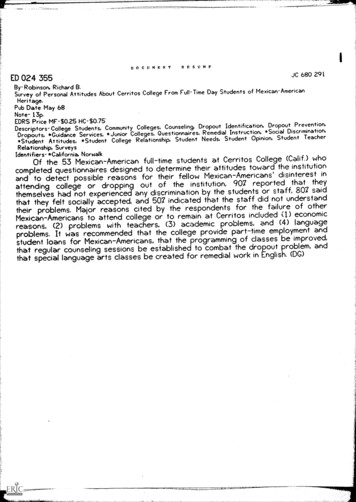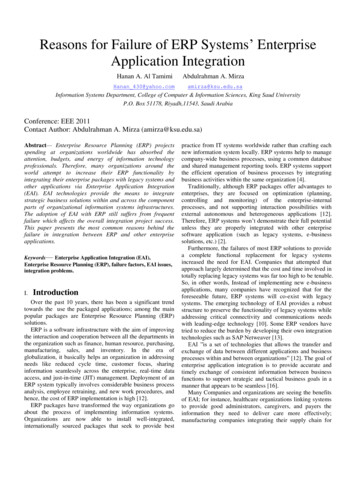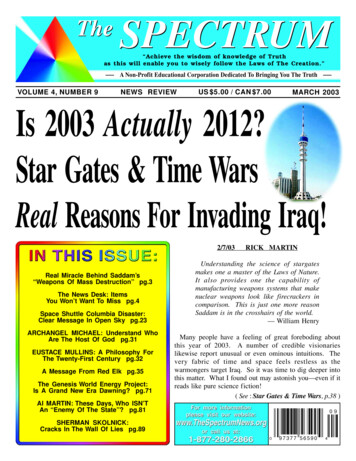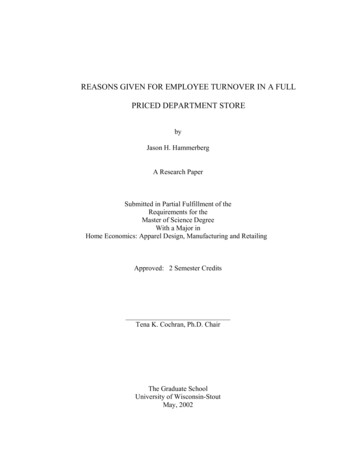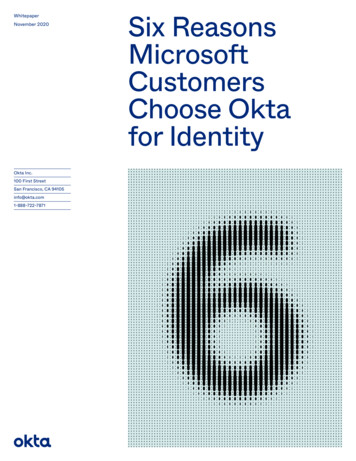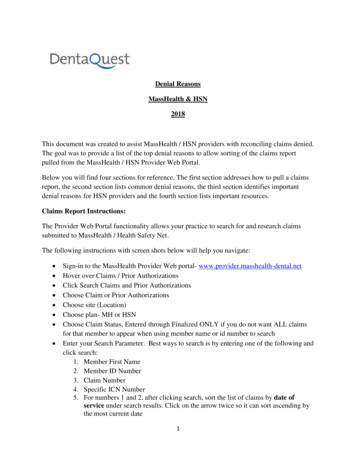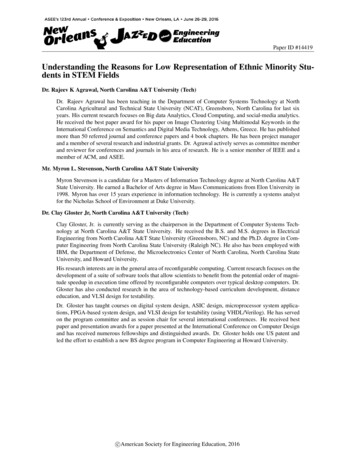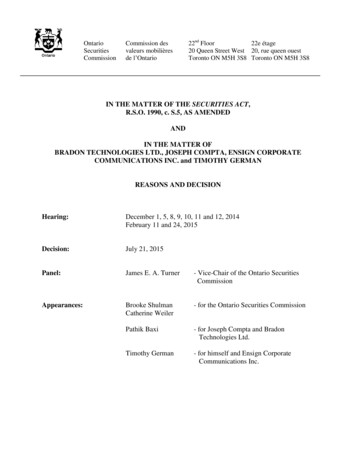
Transcription
OntarioSecuritiesCommissionCommission desvaleurs mobilièresde l’Ontario22nd Floor22e étage20 Queen Street West 20, rue queen ouestToronto ON M5H 3S8 Toronto ON M5H 3S8IN THE MATTER OF THE SECURITIES ACT,R.S.O. 1990, c. S.5, AS AMENDEDANDIN THE MATTER OFBRADON TECHNOLOGIES LTD., JOSEPH COMPTA, ENSIGN CORPORATECOMMUNICATIONS INC. and TIMOTHY GERMANREASONS AND DECISIONHearing:December 1, 5, 8, 9, 10, 11 and 12, 2014February 11 and 24, 2015Decision:July 21, 2015Panel:James E. A. Turner- Vice-Chair of the Ontario SecuritiesCommissionAppearances:Brooke ShulmanCatherine Weiler- for the Ontario Securities CommissionPathik Baxi- for Joseph Compta and BradonTechnologies Ltd.Timothy German- for himself and Ensign CorporateCommunications Inc.
TABLE OF CONTENTSA. OVERVIEW. 11. Background .12. The Respondents .1(a) Bradon and Compta .1(b) Ensign and German.2B. GERMAN’S NON-ATTENDANCE FOR CLOSING SUBMISSIONS AT THE MERITS HEARING . 2C. ISSUES TO BE ADDRESSED . 3D. STANDARD OF PROOF . 4E. EVIDENCE PRESENTED . 41.2.3.4.5.Overview of the Alleged Misconduct .4Staff’s Witnesses .8Compta’s Testimony . 13Credibility . 14Agreed Facts . 16F. DID GERMAN AND ENSIGN TRADE IN SECURITIES WITHOUT REGISTRATION? . 161. Applicable Law . 162. Discussion . 183. Findings . 20G. DID GERMAN AND ENSIGN ENGAGE IN ILLEGAL DISTRIBUTIONS OF SECURITIES? . 211. Applicable Law . 212. Discussion . 223. Findings . 23H. DID GERMAN AND ENSIGN MAKE PROHIBITED REPRESENTATIONS TO POTENTIALINVESTORS? . 231. Applicable Law . 232. Discussion . 243. Findings . 24I. THE LAW RELATED TO FRAUD . 25J. DID GERMAN AND ENSIGN COMMIT FRAUD? . 291. Discussion . 292. Finding . 323. German’s Relationship with Ensign . 32K. DID COMPTA AND BRADON COMMIT FRAUD? . 331.2.3.4.5.6.Compta’s Involvement with Investors . 33Conclusions as to Compta’s Knowledge and Actions . 39Did Compta and Bradon Commit Fraud? . 40Findings . 41Participation by Compta in German’s Fraudulent Acts . 42Findings . 43L. DID GERMAN AND COMPTA AUTHORIZE, PERMIT OR ACQUIESCE IN BREACHES OF THEACT BY ENSIGN AND BRADON, RESPECTIVELY?. 441. Applicable Law . 44i
2. Conclusions . 45M. CONDUCT CONTRARY TO THE PUBLIC INTEREST . 45N. FINDINGS . 45ii
REASONS AND DECISIONA. OVERVIEW1. Background[1] This was a hearing before the Ontario Securities Commission (the “Commission”) pursuantto sections 127 and 127.1 of the Securities Act, R.S.O. 1990, c. S.5, as amended (the “Act”) toconsider whether Bradon Technologies Ltd. (“Bradon”), Joseph Compta (“Compta”), EnsignCorporate Communications Inc. (“Ensign”) and Timothy German (“German”) (collectively, the“Respondents”) breached the Act, committed fraud and/or acted contrary to the public interest.[2] A Statement of Allegations was filed by Staff of the Commission (“Staff”) onOctober 3, 2013 and a Notice of Hearing was issued by the Commission on the same day. Staffalleges that during the period from December 28, 2007 to April 20, 2011 (the “Material Time”),German and Ensign breached subsections 25(1)(a) of the Act (in force beforeSeptember 28, 2009) and subsection 25(1) of the Act (in force on and after September 28, 2009)(trading without registration), subsection 38(1)(a) of the Act (prohibited representations),subsection 53(1) of the Act (illegal distribution of securities), and each of the Respondents’committed fraud and breached section 126.1(b) of the Act and acted contrary to the publicinterest. In addition, Staff alleges that as directors and officers of Bradon and Ensign,respectively, Compta and German are deemed also to have contravened Ontario securities lawpursuant to section 129.2 of the Act.[3] The hearing on the merits commenced on December 1, 2014 and was conducted over ninehearing days. Oral closing submissions were heard on February 24, 2015.[4] Throughout the merits hearing, Compta and Bradon were represented by legal counsel.German represented himself and Ensign.[5] These reasons constitute my decision and reasons on the merits.2. The Respondents(a) Bradon and Compta[6] Bradon is an Ontario company with an office in Mississauga which was incorporated onMarch 18, 2004. Bradon is a software company whose business objective is to developtechnology in the on-line meeting market as well as mobile Voice-over-IP (VoIP) products.Bradon developed SAViiDesk, which is described as an application that allows participants totalk, share data, and video stream from a webcam simultaneously over the internet from personalcomputers and mobile devices. SAViiDesk appears to be Bradon’s only product.[7] Bradon is a private company and was not a reporting issuer in Ontario during the MaterialTime. Bradon has distributed its shares to investors under the private issuer exemption in section2.4 of National Instrument 45-106 – Prospectus and Registration Requirements (“NI 45-106”).Bradon also filed with the Commission one Form 45-106F1 – Report of Exempt Distributiondated October 25, 2010 under the accredited investor exemption in section 2.3 of NI 45-106.1
[8] Compta is an Ontario resident and the founder of Bradon. He is a director, shareholder andPresident of Bradon and its directing mind.[9] Neither Compta nor Bradon has ever been registered with the Commission in any capacity.(b) Ensign and German[10] Ensign is an Ontario private company which was incorporated on June 4, 2004. Ensignwas not a reporting issuer in Ontario during the Material Time. Ensign operated out of a virtualoffice space in Toronto.[11] German is an Ontario resident who is Ensign’s sole director and shareholder. He is alsothe President and the directing mind of Ensign.[12] No prospectus was filed and no receipt was issued by the Director under the Act to permitthe purported sale during the Material Time by German of his Bradon shares.[13] Neither German nor Ensign has ever been registered with the Commission in anycapacity.B. GERMAN’S NON-ATTENDANCE FOR CLOSING SUBMISSIONS AT THEMERITS HEARING[14] German attended the merits hearing on December 1, 5, 8, 9, 10, 11 and 12, 2014. Theevidence portion of the merits hearing concluded on December 12, 2014 and oral closingsubmissions were scheduled for February 11, 2015.[15] German was present at the hearing when closing submissions were scheduled and theCommission issued an order setting the date for those submissions (Re Bradon (2014), 37O.S.C.B. 11270). That order also required that the Respondents file any written materials inconnection with closing submissions by February 4, 2015.[16] German did not file any written materials in connection with closing submissions. He didnot attend the hearing on February 11, 2015.[17] On February 11, 2015, an adjournment of the hearing was requested by Compta’s legalcounsel for medical reasons and an adjournment was granted rescheduling closing submissionsfor February 24, 2015 (Re Bradon (2015), 38 O.S.C.B. 1569). Staff sent German a copy of thatorder to notify him of the revised date for closing submissions.[18]German did not appear for oral closing submissions on February 24, 2015.[19] Subsection 6(1) of the Statutory Powers Procedure Act, R.S.O. 1990, c. S.22, as amended(the “SPPA”) requires that the parties to a Commission proceeding be given reasonable notice ofa hearing.[20] The SPPA permits the Commission to proceed in the absence of any party that has beengiven reasonable notice of a hearing. Subsection 7(1) of the SPPA states:2
Effect of non-attendance at hearing after due notice7. (1) Where notice of an oral hearing has been given to a party to a proceeding inaccordance with this Act and the party does not attend at the hearing, the tribunalmay proceed in the absence of the party and the party is not entitled to any furthernotice in the proceeding.[21] Similarly, the Commission’s Rules of Procedure (2014), 37 O.S.C.B. 4168 (the“Commission’s Rules”) state:Rule 7.1 – Failure to Participate:If a Notice of Hearing has been served on any party and the party does not attendthe hearing, the Panel may proceed in the party’s absence and that party is notentitled to any further notice in the proceeding.[22] In the circumstances, I was satisfied that notice of the hearing date for closingsubmissions was given to German. He was sent the order that rescheduled the date for thosesubmissions. Accordingly, I was entitled to proceed in his absence in accordance withsubsection 7(1) of the SPPA and Rule 7.1 of the Commission’s Rules, and I did so.C. ISSUES TO BE ADDRESSED[23]Staff’s allegations raise the following issues:(a)Did German and Ensign trade in securities without registration contrary tosubsections 25(1)(a) of the Act, in force before September 28, 2009 and subsection25(1) of the Act, in force on and after September 28, 2009?(b)Did German and Ensign distribute securities without filing, and obtaining a receiptfor, a prospectus in breach of subsection 53(1) of the Act?(c)Did German and Ensign make prohibited representations to potential investors inbreach of subsection 38(1)(a) of the Act?(d)Did each of the Respondents commit fraud and breach section 126.1(b) of the Act?(e)Did German authorize, permit or acquiesce in Ensign’s breaches of the Act, suchthat he is deemed, pursuant to section 129.2 of the Act, to also have not compliedwith Ontario securities law?(f)Did Compta authorize, permit or acquiesce in Bradon’s breach of section 126.1(b)of the Act, such that he is deemed, pursuant to section 129.2 of the Act, to also havenot complied with Ontario securities law?(g)Was the foregoing conduct of the Respondents contrary to the public interest?3
D. STANDARD OF PROOF[24] The standard of proof in this matter is the civil standard of proof on a balance ofprobabilities. I will address the questions set out in paragraph [23] above, including the questionwhether a fraud was perpetrated, to determine whether on a balance of probabilities “ it is morelikely than not that the event[s] occurred” (F.H. v. McDougall, [2008] 3 S.C.R. 41 at para. 44(“McDougall”)).[25] I note that an allegation of fraud and breach of section 126.1(b) of the Act are veryserious allegations. The Commission stated in Re ATI Technologies Inc. (2005), 28 O.S.C.B.8558 that “as a matter of fundamental fairness reliable and persuasive evidence is required tomake adverse findings where those findings will have serious consequences for a respondent” (atpara. 15). The seriousness of the allegations does not, however, change the standard of proof tobe applied in this matter. As stated by the Supreme Court of Canada, in McDougall “ evidencemust always be sufficiently clear, convincing and cogent to satisfy the balance of probabilitiestest” (McDougall, supra at para. 46). Accordingly, Staff must prove its allegations on a balanceof probabilities based on clear, convincing and cogent evidence.E. EVIDENCE PRESENTED1. Overview of the Alleged MisconductPurchase by Investors of Bradon Shares through German[26] From December 28, 2007 to April 20, 2011, German purported to sell Bradon shares to atleast 46 investors for an aggregate purchase price of 1,755,505.68. In almost all cases, theshares were sold by German to investors at a price of 5.00 per share (there was one transactionat 2.50 per share and one at 1.00 per share). Except as otherwise noted in paragraph [29]below, contemporaneously with such sales, German subscribed for Bradon shares at 1.00 pershare.[27] During the Material Time, German subscribed for 748,000 Bradon shares in 26 separatetransactions. Those Bradon shares were issued and registered in German’s name.[28] While Ensign received an aggregate of 1,755,505.68 from investors as consideration forthe purchase of German’s Bradon shares, only 808,000 was used by German to subscribe forBradon shares. As for the remaining 947,505.68, an aggregate of 125,000 was returned byEnsign and German to five investors (which included WC and JS’s sister) and the balance of 822,505.68 is unaccounted for.[29] Investors understood that they were buying Bradon shares from German and that the fullpurchase price was going to Bradon. It is clear on the evidence that, as investors purchasedBradon shares from German, German would aggregate or pool those investments and then applya portion of the funds to acquire a similar number of Bradon shares, in his name, at a price of 1.00 per share (I note that German purchased Bradon shares at a price of 2.50 a share on hislast four purchases). The Bradon shares owned by German were subject to resale restrictionsunder Ontario securities law and could not be transferred or resold without the approval of theBradon board of directors. The latter restriction was contained in Bradon’s charter and was4
reflected on the share certificates for Bradon shares. None of the Bradon shares owned oracquired by German were actually transferred to or registered in the name of investors. Comptatestified that Bradon was never requested by German to issue any Bradon shares to investors.[30] German directed investors to pay the purchase price of the Bradon shares to Ensign fordeposit in an Ensign bank account.[31] German solicited investors to purchase Bradon shares from him. Those investors includedGerman’s friends, business acquaintances or contacts, and individuals referred to him by otherinvestors in Bradon shares purchased from German. German told investors that Bradon wasabout to be acquired by a major technology company either imminently or within 60 to 90 daysand that investors would profit immensely once a deal was completed (see, for instance, theinvestor testimony in paragraphs [55] and [66] of these reasons). Investors were led to believethat such a transaction was only a matter of time.The Share Purchase Agreements[32] In purchasing Bradon shares through German, investors would enter into a one-page“private share purchase agreement” on Ensign letterhead which defined “Ensign” as Ensign orGerman. The agreements stated that German “has agreed privately” to grant the investor anoption to purchase the relevant Bradon shares and that upon execution of the agreement, “Mr.German will instruct BTI to register the shares pursuant to the direction of [blank].” As notedabove, German was the registered shareholder of the Bradon shares purported to be sold toinvestors.[33]The share purchase agreement also stated that:Bradon Technologies Inc. (BTI) is a private Ontario Registered software companythat has developed proprietary software, algorithms, branded products and clientsfor interactive business and consumer communications. It has approximately8,300,000 shares outstanding (fully diluted). BTI is currently involved in seniorlevel negotiations and due-diligence reviews with several of its clients/strategicpartners with an anticipated sale of all its assets (including: paten
Jul 21, 2015 · German represented himself and Ensign. [5] These reasons constitute my decision and reasons on the merits. 2. The Respondents (a) Bradon and Compta [6] Bradon is an Ontario company with an office in Mississauga which was incorporated on March 18, 2004. Bradon is a softwar
